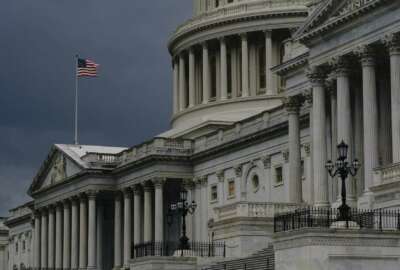To listen to the Federal Newscast on your phone or mobile device, subscribe in PodcastOne or Apple Podcasts. The best listening experience on desktop can be found using Chrome, Firefox or Safari.
- A federal court has denied the government’s request to dismiss a class action suit over the partial government shutdown that ended in January of 2019. Judge Patricia Campbell-Smith of the U.S. Court of Federal Claims rejected the government’s claim that it was prohibited from paying employees during the appropriation because of the Anti-Deficiency Act. She set a deadline of January 29 for the government to respond to the suit, which seeks liquidated damages for the delayed payment of salaries. D.C. Attorney Heidi Burakiewicz said she added more than 32,000 new plaintiffs yesterday.
- The White House says it supports a pay freeze for civilian federal employees next year. It’s the first time the administration expressed definitive support for a federal pay freeze. President Trump originally proposed a 1% pay raise for civilian employees back in February. Senate Republicans proposed a pay freeze for civilian federal employees as part of the appropriations bills they released last month. House and Senate leadership are now negotiating the details for a broader catch-all spending package. Current government funding expires next Friday.
- The inspector general at the Department of Veterans Affairs found some truth to the complaints a whistleblower made last year about VA’s electronic wait lists. The whistleblower said VA’s wait lists didn’t include patients who had been waiting two years or longer for an appointment. There were also some discrepancies in the number of entries on VA’s public wait time website and its internal sites. But the IG says VA reviewed these sites last summer, cleared up some discrepancies and removed some patients from the wait list.
- Another senior Defense official has been forced out of the Pentagon. Christopher Maier, the civilian who’s led the DoD office in charge of countering the Islamic State for almost three years, is the latest official to be terminated in the waning days of the Trump Administration. In a statement to the Associated Press, the Pentagon gave no reason for his departure. The department says its counter-IS functions will be absorbed into other elements of the Pentagon bureaucracy that are led by officials President Trump appointed after he fired Defense Secretary Mark Esper last month. (Federal News Network)
- The Defense Department is awarding $50 million to universities for research equipment. The grants will be provided to 85 institutions in 33 states in 2021 as part of the Defense University Research Instrumentation Program. DoD says the effort enables schools to perform state-of-the-art studies that boost the United States technological edge and ensure the future science workforce remains unparalleled. The Pentagon received 742 requests for funding from the program.
- DoD sheds a little more light on why it continues to pursue its JEDI cloud program. DoD Chief Information Officer Dana Deasy said the requirements under the controversial JEDI cloud program remain valid despite the contract being tied up in litigation for almost two years. In a letter to Sen. Chuck Grassley (R-Iowa), Deasy said the contract requires commercial parity with the vendor’s public offering to ensure DoD has full access to the latest innovations at equivalent costs. Additionally, Deasy says the program requires the vendor to manage a catalog listing their newest cloud services. The question about whether JEDI’s requirements remained valid was one of 17 Grassley asked after DoD provided a briefing in October.
- The Air Force was hurting for people just a few year ago. Now the tide has turned. It has been reliably providing bonuses to airmen who continue to work in-demand jobs. Some of those careers might not be as lucrative in the coming year though. The Air Force’s personnel chief says the service is closing the gap on certain career shortages and even has about 900 more airman than it expected at the end of 2020. That means the Air Force probably won’t be sending out as many retention bonuses in the future. It’s likely that many airmen are staying in the military since COVID-19 has upended the job market. (Federal News Network)
- The General Services Administration is helping agencies make the switch to unattended bots. The soon-to-be-released digital worker handbook outlines how agencies should assess the level of risk associated with bots, and generally assigns a higher level of risk to unattended bots. The handbook recommends agencies routinely conduct reviews to determine whether a bot has the privileges it needs to complete its tasks task, but none beyond that. (Federal News Network)
- House Democrats and the Trump administration are calling on congressional leaders to give the IRS additional funding. Twenty-five lawmakers are asking House and Senate leadership to push for more than a $12 billion IRS budget for the rest of fiscal 2021. That’s more than half a billion dollars more than what the Senate Appropriations Committee has approved. Meanwhile, the Trump administration is asking for additional IRS funding for the agency to stand up more digital services under the Taxpayer First Act.
- The Trump administration makes one last plea to lawmakers to fully fund several of its key technology initiatives. In a letter to Senate appropriators, the Office of Management and Budget asked for the Senate to allocate the White House’s full request of $150 million for the Technology Modernization Fund, $20 million for the NewPay shared services effort and $5 million for the Energy Department’s Artificial Intelligence and Technology Office. The Senate did provide the National Archives its full request of $9 million to help agencies move to electronic records and supported the Treasury Department’s financial management shared services effort.
Copyright
© 2024 Federal News Network. All rights reserved. This website is not intended for users located within the European Economic Area.




